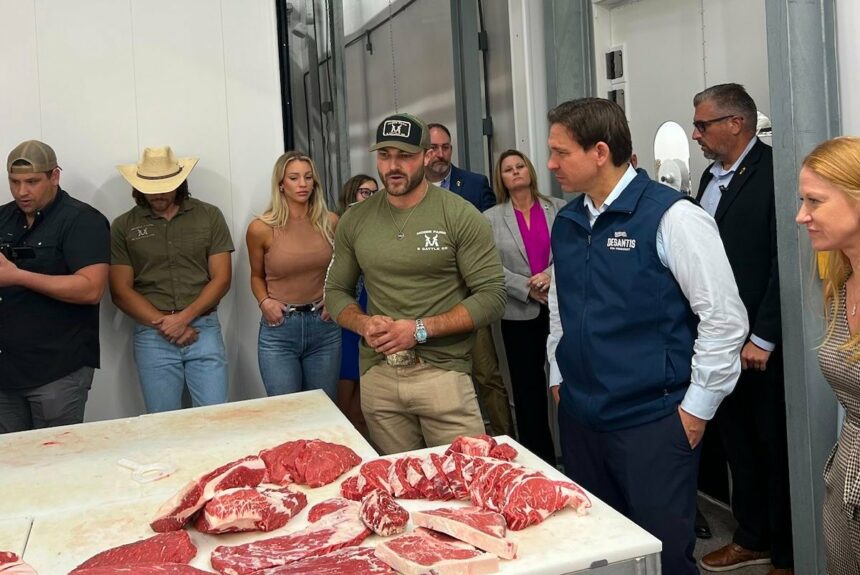When Florida Governor Ron DeSantis signed a bill into law banning the sale and distribution of synthetic meat in Florida he illustrated the perils of synthetic conservatism –the notion that using state power to limit individual freedom is wrong unless it generates applause from your tribe.
In a statement, DeSantis said, “Today, Florida is fighting back against the global elite’s plan to force the world to eat meat grown in a petri dish or bugs to achieve their authoritarian goals. Our administration will continue to focus on investing in our local farmers and ranchers, and we will save our beef.”
>>>READ: Lab Grown Algae Could Play a Pivotal Role in Reducing Global Emissions
Florida Commissioner of Agriculture Wilton Simpson amplified DeSantis’ remarks: “Lab-grown meat is a disgraceful attempt to undermine our proud traditions and prosperity, and is in direct opposition to authentic agriculture … We must protect our incredible farmers and the integrity of American agriculture.”
As a farmer, I’m committed to protecting the integrity of American agriculture. But “coercion for me but not for thee” is not a winning strategy. In fact, this approach will make all farms less secure.
Chef Andrew Gruel offered a wise take on X:
So, let’s start with education. In 2024, synthetic meat isn’t remotely close to threatening American agriculture or beef ranchers but some companies are indeed guilty of the sin of wanting to compete in a free market.
One example is Aleph Farms, headquartered in Rehovot, Israel. CEO Didier Toubia has adopted a Tesla strategy to growth by first creating a premium product like steak to drive acceptance of synthetic meat more broadly.
Toubia told Time Magazine, “We need to emotionally connect with consumers if we want to drive acceptance. Starting at the higher end is a way to position our product to make it more appealing.”
Toubia knows he has to win over people like me to be successful. I spent the first half of my life in Kansas City where I acquired a taste for world-class steaks and barbeque. Now that I have my own farm, I regularly cook with fire using a variety of implements, including hand-split cheery wood from fallen trees on my land (I soak it for ribs and pulled pork). I’ve also strongly criticized grilling bans and made the environmental case for cooking with fire.
The technical challenge Toubia is tackling is the architecture of meat itself, which is exquisite and complex. Real meat flavor doesn’t come from muscle cells that can be grown in a lab but from fat, connective tissue and the vascular network. Ribeye steaks are popular because of their marbling (I recently fed six people with a 3-pound Tomahawk bone-in ribeye). Melt in your mouth pulled pork comes from collagen dissolution, and the bark on pulled pork comes from melting fat merging with caramelized sugars in barbeque sauce. Fall-off-the-bone ribs are the result of contracting meat pulling away from melting connective tissue that connects muscle to bone. Labs are a long, long way from replicating these experiences even with 3D bioprinters.
AIeph Farms promotes their Aleph Cuts on their site and boasts of their “thin steaks with thick flavor.” Consider me impressed by Toubia’s vision and passion but not his product. So, as a citizen, I’m left with a choice. I can work to criminalize Toubia’s entrepreneurial vision, or I can opt to not buy his product. I choose the latter.
Now, some consumers will be so racked with guilt from eating meat from real cows that they’ll settle for an inferior product. The way to reach that constituency isn’t by banning lab meat but by educating them about the merits of emissions reduction policies (like those in our Climate and Freedom Agenda) that will do vastly more to help the planet.
>>>READ: 2024: The Year of Freedom Conservatism
By embracing coercion over choice on lab meat, Florida is also weakening the right’s best arguments against climate authoritarianism and muddying other critically important fronts in the woke wars. Our arguments against top-down conformity and coercion in areas like DEI, ESG and de-banking lose their potency when we use state power to impose our preferred norms.
Real conservatism is an uncompromising defense of classical liberalism – individual liberty and free markets – against top-down, command and control policies, and coercive conformity. Synthetic conservatism defends these principles as long as it generates tribal applause. Real conservatism welcomes competition. Synthetic conservatism bans competition. Real conservatism celebrates liberty. Synthetic conservatism rationalizes coercion.
Other states should take note. Instead of using coercion, they should embrace choice and show guilt-ridden consumers there’s a better, smarter, and faster way to reduce emissions.
The views and opinions expressed are those of the author’s and do not necessarily reflect the official policy or position of C3.
